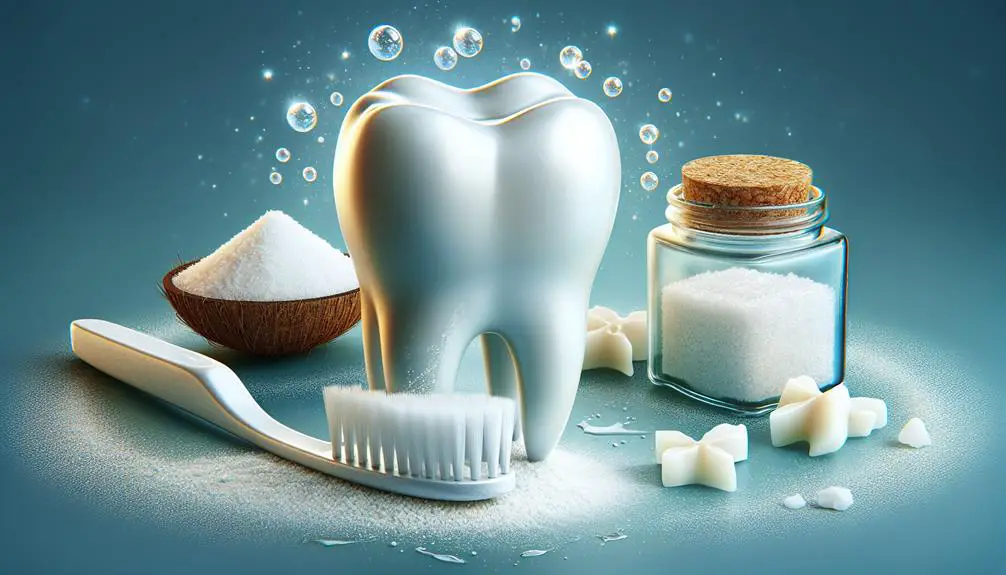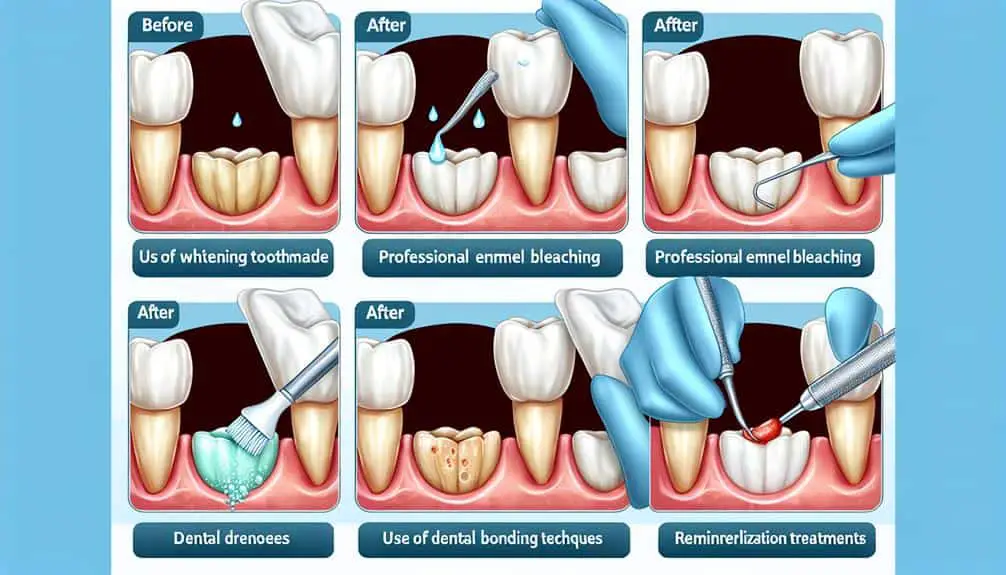Protect your enamel with these enamel-friendly whitening techniques. Start by using enamel-friendly whitening toothpaste with gentle abrasives and low levels of hydrogen peroxide. Consider hydrogen peroxide gel application to effectively break down stains while maintaining enamel health. You can also try a DIY baking soda and lemon scrub, but use it sparingly to avoid enamel damage.
For professional results, choose an in-office whitening treatment administered by a dental professional to guarantee enamel restoration and long-term benefits. Enamel-protecting whitening strips are a convenient at-home option designed to be gentle yet effective in whitening teeth. Try these techniques for a brighter smile without compromising your enamel health.
Key Points
- Choose enamel-friendly whitening toothpaste with gentle abrasives and low hydrogen peroxide levels.
- Consider hydrogen peroxide gel application for effective stain removal while maintaining enamel health.
- Use a DIY baking soda and lemon scrub sparingly to remove surface stains with caution.
- Opt for professional in-office whitening treatments for enamel restoration and long-term benefits.
- Utilize enamel-protecting whitening strips at home with gentle bleaching agents like hydrogen peroxide.
Enamel-Friendly Whitening Toothpaste
When selecting an enamel-friendly whitening toothpaste, opt for a product that contains gentle abrasives and low levels of hydrogen peroxide to minimize potential enamel damage. Natural remedies like baking soda and activated charcoal are often found in these toothpaste formulas, providing a significant alternative to harsh chemicals. These ingredients help in maintaining enamel health while still effectively removing surface stains.
Enamel care is important when choosing a whitening toothpaste. Look for products that are specifically formulated to be gentle on enamel, as enamel is essential for protecting your teeth from decay and sensitivity. Whitening toothpaste with natural ingredients can be a good choice for those who are concerned about enamel erosion. Additionally, consider consulting with your dentist to find the best toothpaste for your specific needs.
Hydrogen Peroxide Gel Application
Consider applying hydrogen peroxide gel as a vital and effective method for whitening your enamel. When utilizing hydrogen peroxide gel, it's important to make sure you follow the correct brushing technique to maximize its benefits while maintaining enamel health. Hydrogen peroxide is a common ingredient in many teeth whitening products due to its ability to break down stains effectively. Its bubbling action helps lift surface stains without causing damage to the enamel when used correctly.
While hydrogen peroxide can be a valuable tool in achieving a brighter smile, it's important to be mindful of your diet choices to prevent enamel erosion. Foods and beverages high in acidity can weaken the enamel, making it more susceptible to damage during whitening treatments. Maintaining a balanced diet and limiting consumption of acidic foods can help preserve your enamel's strength and integrity while using hydrogen peroxide gel for whitening purposes. Remember, always consult with your dentist before starting any whitening regimen to ensure it's appropriate for your oral health needs.
DIY Baking Soda and Lemon Scrub
To effectively brighten your enamel at home, try creating a DIY baking soda and lemon scrub. Baking soda is a vital abrasive that can help remove surface stains on teeth, while lemon juice contains citric acid, which may have whitening properties. When combined, these natural alternatives can potentially enhance the brightness of your smile. However, it's essential to proceed with care when using this mixture.
DIY precautions are essential when utilizing homemade whitening solutions. Lemon juice is acidic and can erode enamel if used excessively. To minimize the risk of damage, it's advisable to limit the frequency of this scrub to once or twice a week. Additionally, due to the abrasive nature of baking soda, it's important not to scrub too vigorously to prevent wearing down the enamel. After using the scrub, rinse your mouth thoroughly to make sure no residue remains on your teeth.
While this DIY method offers a cost-effective approach to teeth whitening, always prioritize the health of your enamel by exercising caution and moderation.
Professional In-Office Whitening Treatment
For a professional and efficient approach to achieving a whiter smile, consider undergoing an in-office whitening treatment administered by a dental professional. In-office whitening treatments offer significant advantages, including enamel restoration and long-term benefits. During the procedure, a highly concentrated bleaching agent is applied to your teeth under carefully controlled conditions to guarantee safety and effectiveness. This allows for a more potent whitening effect compared to over-the-counter products.
Enamel restoration is a key benefit of in-office whitening treatments. The professional-grade whitening agents used in these treatments can help remove tough stains and discoloration from the surface of your teeth without compromising the integrity of your enamel. Additionally, the results of in-office whitening tend to last longer than those from DIY methods, providing you with a brighter smile for an extended period.
Enamel-Protecting Whitening Strips
Explore the enamel-protecting benefits of whitening strips as a convenient at-home alternative to professional in-office treatments for achieving a brighter smile. When considering enamel preservation, whitening strips offer a gentle yet effective way to whiten teeth without causing significant harm to the enamel. Research has shown that certain whitening strips are designed to be enamel-safe, using ingredients that help safeguard the outer layer of teeth while effectively removing stains.
Whitening strips work by utilizing a bleaching agent, usually hydrogen peroxide or carbamide peroxide, to break down stains and discoloration on the teeth's surface. While these agents can penetrate the enamel to some extent, enamel-safe formulations make sure that the process is controlled and minimizes potential damage. It's crucial to follow the instructions provided with the whitening strips to guarantee their best and safe use.
When used correctly and consistently, whitening strips can be a convenient and cost-effective way to enhance the brightness of your smile while prioritizing enamel protection. If you're looking for a home whitening solution that balances whitening strip effectiveness with enamel preservation, consult with your dentist to find the most suitable option for your needs.
Frequently Asked Questions
Can Pregnant Women Safely Use Enamel-Friendly Whitening Toothpaste?
During pregnancy, being cautious about the products you use is essential. Enamel-friendly whitening toothpaste is typically safe for pregnant women, but it's wise to consult your healthcare provider for personalized advice on enamel safety.
How Often Should Hydrogen Peroxide Gel Be Applied for Optimal Whitening Results?
For top-notch whitening results, apply hydrogen peroxide gel every 1-2 weeks. Comparing outcomes, more frequent use may not be better. Guarantee enamel health by following recommended application frequency. Prioritize whitening safety over excessive applications.
Are There Any Potential Risks or Side Effects Associated With Using a DIY Baking Soda and Lemon Scrub for Whitening Teeth?
When using a DIY baking soda and lemon scrub for teeth whitening, safety concerns exist due to potential enamel erosion and increased tooth sensitivity. The effectiveness debate continues, with some seeing results but risking oral health.
What Is the Average Cost of a Professional In-Office Whitening Treatment?
When comparing costs of professional in-office whitening treatments with other whitening options, consider the long-term benefits. Professional treatments may offer more lasting results, but prices vary depending on location and the specific services included.
Are Enamel-Protecting Whitening Strips Suitable for Individuals With Sensitive Teeth?
For individuals with sensitive teeth, enamel-protecting whitening strips can be suitable. These gentle products offer effectiveness in whitening while aiding in sensitivity management. They provide a balance between enamel protection and achieving desired results.



